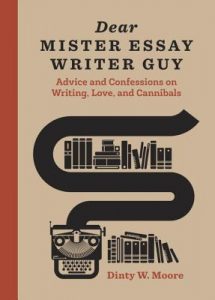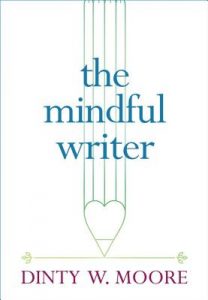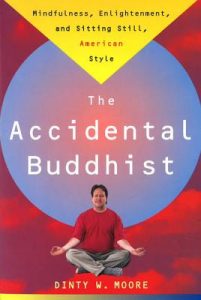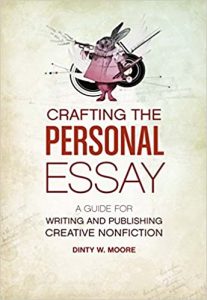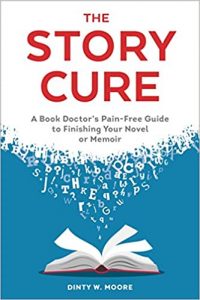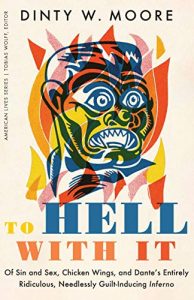Hard Work Brings Success: An Interview with Dinty W. Moore
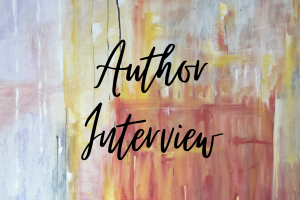 For most of 2021 and much of 2022, this author interview series focused on debut authors. My main goal was to support the authors I’d met in various debut groups as we all launched our books. But in thinking about the interview schedule and the purpose of this series, my desire to reach out to authors and artists I’d admired for a long time sat up and said, “Remember me?” The inimitable Dinty W. Moore was one of the first people I contacted, and let me tell you, when he said he’d be willing to answer some questions for me, a literal happy dance in my chair ensued (no joke).
For most of 2021 and much of 2022, this author interview series focused on debut authors. My main goal was to support the authors I’d met in various debut groups as we all launched our books. But in thinking about the interview schedule and the purpose of this series, my desire to reach out to authors and artists I’d admired for a long time sat up and said, “Remember me?” The inimitable Dinty W. Moore was one of the first people I contacted, and let me tell you, when he said he’d be willing to answer some questions for me, a literal happy dance in my chair ensued (no joke).
To be clear, I have never met Dinty W. Moore in real life, and if I did, I would definitely have a fan-girl moment. That’s how much he has affected me and my writing.
Dinty has authored a multitude of works including To Hell with It: Of Sin and Sex, Chicken Wings, and Dante’s Entirely Ridiculous, Needlessly Guilt-Inducing Inferno (which sports one of my favorite covers ever); Dear Mister Essay Writer Guy: Advice and Confessions on Writing, Love, and Cannibals; Crafting The Personal Essay: A Guide for Writing and Publishing Creative Nonfiction (a friend swears by this book); The Mindful Writer; The Story Cure: A Book Doctor’s Pain-Free Guide to Finishing Your Novel or Memoir; The Accidental Buddhist: Mindfulness, Enlightenment, and Sitting Still, American Style (truly an enlightening read); and more. He’s also edited multiple books and has been published in venues such as Creative Nonfiction, The Georgia Review, Harpers, LitHub, The Philadelphia Inquirer Magazine, The New York Times Sunday Magazine, and Writer’s Digest (to name a few). His involvement with Brevity: A Journal of Concise Literary Nonfiction spans over two decades.
Despite his long list of prolific works, Dinty doesn’t intimidate—he encourages. And I think part of that is because of his humor and honesty no matter what the topic is. Case in point? His website, where he ends his About page with: “He is deathly afraid of polar bears.” (Might I also add that the sentiment makes up the entirety of his Instagram bio? You can read a little about it here.) All kidding aside, I’m so grateful to Dinty for his time and attention in answering my questions. I hope you enjoy this interview as much as I did.
Christina: I’m intrigued by the bio on your website that says you’ve had brief stints as “a zookeeper, a modern dancer, a Greenwich Village waiter, a documentary filmmaker, and a wire service journalist.” Those careers didn’t pan out, and we’re grateful for that. But do you see any connection between them all? Why did those careers call to you, or what purpose did they serve at the time? Do you see any parallels between those experiences and being an author?
Dinty: The connection, I suppose, it that I was restless, I moved a lot in my early twenties, from city to city, and I moved from job to job, trying to find a fit. That restless spirit (it didn’t feel like an asset at the time, by the way, it felt desperate and like failure) is probably why being a nonfiction writer has worked out well for me. I was able to write essays, and eventually books, on a wide range of topics, skipping from subject to subject, curiosity to curiosity, like a big old bird hopping from tree to fence to another fence to another tree.
I suppose—and I am making all of this up in response to your question; I certainly didn’t realize it at the time—that zookeeper, performing artist, waiter, documentary filmmaker, and journalist all require split second innovation, problem-solving on the fly. Which has served me well as a writer too.
Christina: One of my favorite books of yours is The Mindful Writer. Every time I pick it up, I think, Dinty makes it all sound so simple. And then I have more confidence in myself and my writing. So I have two questions here: 1. Do you ever have self-doubt, and if so, do you have any tips to overcome it? 2. Do you make house calls?
Dinty: Oh my, what an illusion we weave with our writing. I am as haunted by self-doubt as any other writer I know, and though I am thankful that you, and many others, have found The Mindful Writer useful in combating the negative voices and swirling mental distractions that besiege us at our writing desks, I often have profound difficulty following my own advice. Being able to say clearly that we need to be mindful, that we need to examine our motives and practices so we might write with more clarity, is easier said than done. So many things in life are. But thank you.
Tips to overcome our self doubt? I have one tip that works best for me. When the negative voices arrive, I don’t fight them. I smile, and say, “Hey, it’s you again negative voices. Hey, feel free to stick around . . . but I’m busy writing, you know, so I can’t engage right now.”
Christina: You were at Ohio University for many years as director of creative writing, where you made a huge impression on your students. In an article on OU’s website, you’re quoted as saying, “Each class I teach, whether undergraduate or graduate students, presents memorable teaching moments.” What is one of the most memorable moments? Did that memorable moment also deliver a good lesson?
Dinty: I’m going to duck your question because it is not the “memorable” moments that deliver the strongest lesson, though there were likely a few unforgettable moments, and they likely involved lots of laughter. What stands out is the persistence, the way a student who seemed okay as a writer but not brilliantly gifted, just middle-of-the-road, worked semester after semester, year after year, until she was a stronger writer than anyone in her cohort, and—I eventually stopped being surprised by this—it was this so-so-at-first but stubborn writer who would show up in my office doorway, or my e-mail inbox, five years later and say, “Well, I have a book coming out, Mr. Moore.” It is the hard work that is memorable, and how the hard work is always the thing that brings success.
Christina: Though you’re retired from OU now, you still teach workshops and such, most notably one in Tuscany in conjunction with Allison K. Williams. Why Tuscany? What about the place lends to your creative spark?
Dinty: I don’t really believe we need beautiful scenery and glowing sunsets to spark creativity: it can happen anywhere. But it does help to get out of our own lives sometimes, to break from the routine that has us stuck somewhere mid-book, mid-chapter. The Tuscan town Allison identified for our retreats, Certaldo, is gorgeous, but also very small, remote, on the top of a hill, so it has the advantage of shaking us out of our routine, clearing some cobwebs, opening some synapses, while at the same time offering limited distractions (there are only a few restaurants, one museum). So, we write for hours each day during our retreats, and talk about writing, and revise together. Then we take in the sunsets. And the food is wonderful. And the wine.
Christina: In an interview with 100 word story, you call yourself a “failed novelist.” Why do you think you didn’t hit it off with writing fiction? Do you feel that creative nonfiction can do something that fiction cannot? Do you read fiction?
Dinty: I actually did pretty well writing short stories, fiction of a set length, but the novel itself is what stymied me, the long haul of making things up. I don’t know why, but I do know that stringing together true stories somehow made more sense to me. If I had extra time—which I certainly don’t—I would try my hand at the novel again. Maybe I was too young. Maybe I know more now. Or maybe I would still be lousy at the form.
Christina: Of course, I can’t conduct an interview of Dinty W. Moore and not talk a little bit about Brevity: A Journal of Concise Literary Nonfiction and its blog. Is there significance to the 750-word limit? Do you read every single submission? What are you most proud of with respect to Brevity?
Dinty: The 750-word length limit was modeled after some flash fiction anthologies I admired back in the 1990s, and what I am proudest of is our longevity—we are coming up on a 25th Anniversary of the journal—and I’m also proud of all the writers we gave space to early in their careers, some of whom have gone on to have a major literary impact.
I used to read every submission, but the monthly submission queue has grown beyond even my wildest dreams, so I have folks who help with screening. It is still exciting to find a gem in the stack however, and still so wonderful to discover a writer early in her career and give her space in the magazine. Community is everything in this profession.
Christina: Because I’m an animal lover, and I want to avoid the topic of polar bears, I’m going to ask about the cats you feature on your Instagram profile. Would you share a little bit about these feline friends?
Dinty: My wife and I have only one cat, a rescue cat named Lucinda who was abandoned on the street near dead. She is sweet and healthy now. The other cats belong to family members, and most of them have bad manners.
Christina: What does literary success mean to you?
Dinty: People read my work, and they think about their lives, and their lives are enriched as a result.
Dinty W. Moore can be found in multiple places!
Website: https://dintywmoore.com/
Flickr: @dinty
Twitter: @brevitymag
Facebook: @dintywmoore
Thanks to Dinty for agreeing to this interview! If you know of an author who’d like to be featured in an interview (or you are an author who would like to be featured), feel free to leave a comment or email me via my contact page.

